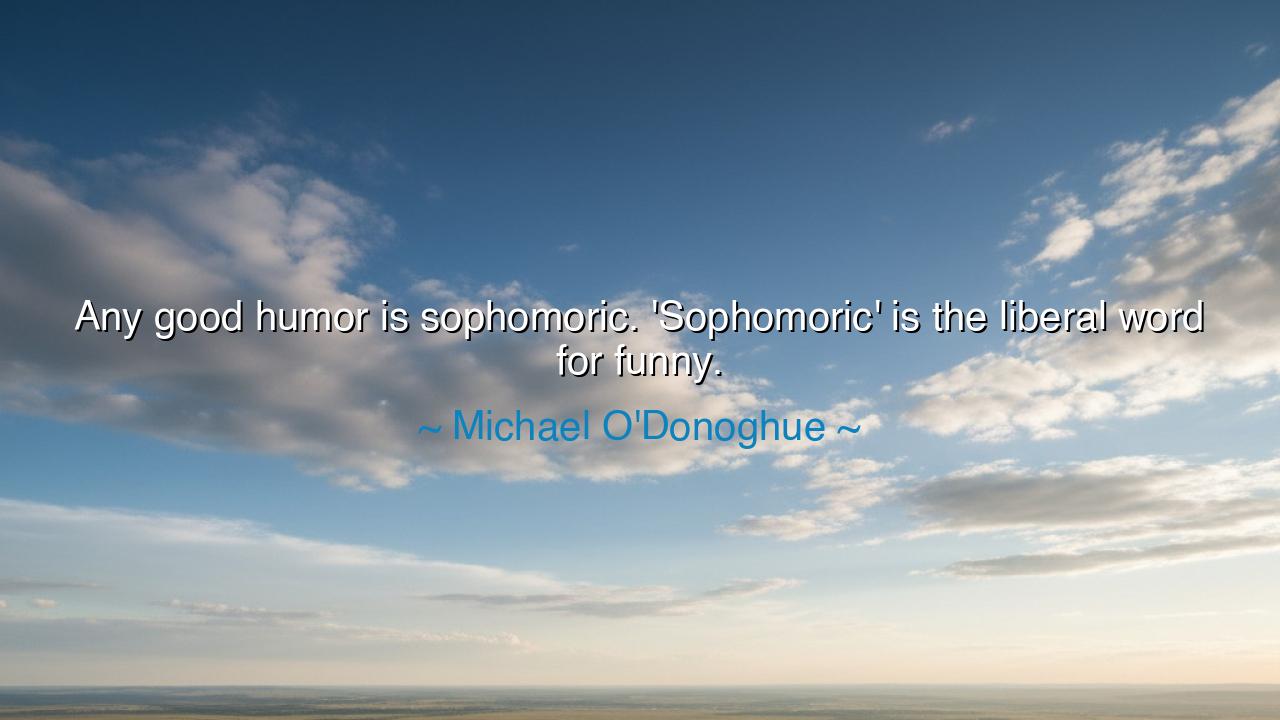
Any good humor is sophomoric. 'Sophomoric' is the liberal word






When Michael O’Donoghue declared, “Any good humor is sophomoric. ‘Sophomoric’ is the liberal word for funny,” he was not speaking in jest alone. Beneath the sharpness of his wit lay a deep truth about the nature of laughter and the human condition. In these few words, he struck at the heart of hypocrisy—the tendency of the “refined” to scorn the simple joy that unites all people. What he meant was that true humor, the kind that makes us laugh from the belly and not the intellect, is often irreverent, childish, and raw. It springs not from the heights of philosophy, but from the earth of our shared absurdity. To call such humor “sophomoric” is to miss its sacred mischief; for in laughter that shocks, mocks, or unsettles, there lives the truest reflection of our humanity.
The origin of this quote lies in the mind of O’Donoghue himself—a man both loved and feared for his brilliance. As one of the founding writers of Saturday Night Live, he reshaped American comedy with a kind of dark, anarchic genius. His humor was savage yet sincere, offensive yet honest. He believed that laughter should unsettle, not soothe; that it should reveal the foolishness of the powerful and the vanity of the pretentious. Thus, when he said “any good humor is sophomoric,” he was mocking those who dismiss irreverence as immaturity. To him, “sophomoric” was not an insult—it was a crown. For it meant that the laughter was alive, unchained by the dull restraint of the self-serious.
In calling good humor “sophomoric,” O’Donoghue revealed a paradox that even the ancients would have recognized: that wisdom often hides beneath foolishness. The philosopher Diogenes, who lived in a barrel and mocked the customs of Athens, was called mad by his peers—but through his madness he spoke truths others dared not. He would enter the marketplace with a lantern in broad daylight, saying, “I am looking for an honest man.” His humor was biting, absurd, “sophomoric,” and yet divine. Like O’Donoghue’s comedy, it stripped away the pomp of pretense and exposed the fragile vanity of men. So it has always been: those who laugh at the world’s absurdities are called foolish by the very world they expose.
True humor, O’Donoghue implies, is not polite—it is disruptive. It tears through illusions and dares to speak the forbidden. It belongs to the court jester who mocks the king, to the playwright who ridicules the tyrant, to the child who blurts out the truth adults are too afraid to say. The word sophomoric, meaning immature or naive, is the label society gives to this kind of laughter, because such humor reminds us of our own hidden immaturity—our fears, our vanity, our pretense of being more “grown-up” than we truly are. But O’Donoghue knew that laughter is not maturity’s enemy; it is its cure. For the one who can laugh, even at himself, is the one who has begun to understand life’s impermanence and irony.
Consider the tale of Charlie Chaplin, whose films in the early twentieth century made the world laugh even as it wept. His humor was simple, physical, and at times ridiculous—he slipped on banana peels, twirled canes, and fell into puddles. Critics of the time called it childish, yet beneath that surface comedy lay the struggle of the poor, the cruelty of modern life, and the beauty of resilience. Chaplin’s laughter, like O’Donoghue’s words, reminds us that the “sophomoric” can be profound, for in the foolish gesture hides the truth too painful to say plainly. When we laugh at life’s absurdity, we do not escape its darkness—we illuminate it.
O’Donoghue’s satire was often ruthless, but at its core was a profound understanding of the human heart. He knew that laughter, even crude laughter, binds us more deeply than solemnity. The man who cannot laugh, he seemed to say, cannot be trusted—for he fears his own vulnerability. The “sophomoric” comedian, then, is the guardian of freedom, daring to offend in order to remind us that no authority, no ideology, no ego is beyond ridicule. Laughter breaks the spell of fear. In the most sacred temples of power, it is often the only weapon left to the powerless. And thus, the humorist becomes a kind of philosopher—one who teaches through jest what others teach through sermons.
The lesson, then, is clear: do not despise the sophomoric, for it is the lifeblood of genuine joy and truth. Laugh not only when it is safe, but when it is needed. Let your humor challenge the false and the proud. Dare to be foolish in a world that worships pretense. In your laughter, let there be both innocence and courage—the innocence to see beauty even in absurdity, and the courage to expose the absurd where it hides behind respectability. For it is the laughter that shakes walls, not the silence that builds them, that keeps the spirit of humanity free.
And so, remember O’Donoghue’s defiant wisdom: “Any good humor is sophomoric.” The world may call it immature, vulgar, or impolite—but it is in this unrefined laughter that truth finds its purest form. For the wise man laughs at himself, the fool laughs at others, and the hypocrite laughs at nothing. Be therefore like the jester, who knows that behind every mask of solemnity lies the trembling smile of mortality. Laugh boldly, laugh honestly, and let your humor remain forever a little “sophomoric”—for that is the laughter that keeps the heart alive.






AAdministratorAdministrator
Welcome, honored guests. Please leave a comment, we will respond soon